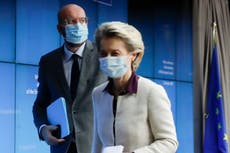Germany denies claim AstraZeneca vaccine is less effective among elderly
Denial comes in response to suggestion that efficacy is as low as 8 per cent in over-65s
Germany and AstraZeneca have both denied media reports that its coronavirus vaccine is substantially less effective among the over-65s, with the pharmaceutical giant calling the dramatic claim “completely incorrect”.
The denial came in response to two articles published in the German papers Handelsblatt and Bild, which both suggested that the Oxford/AstraZeneca jab has an efficacy as low as 8 per cent for the elderly.
Handelsblatt attributed its claim to “multiple sources familiar with the German vaccination policy” within the Berlin administration, who it said were speaking on condition of anonymity.
Bild reported that German officials were afraid the vaccine might not be approved by the European medical regulator for those over 65. But the German health ministry said on Tuesday that the claims made in the papers were unfounded, insisting that the data does not support any suggestion of impaired performance of the jab among older people.
AstraZeneca also strongly denied the claims in a written statement, saying that “reports that the AstraZeneca/Oxford vaccine efficacy is as low as 8 per cent in adults over 65 years are completely incorrect”.
Downing Street voiced concern that the reports may undermine the willingness of elderly people in Britain to accept the Oxford/AstraZeneca jab.
Boris Johnson’s official spokesperson told reporters: “The important thing is to ensure the public remain confident that it is both safe and effective and continue to come forward to receive the vaccine when invited to do so.
“Both Oxford and AstraZeneca have come out to make it clear that there is no basis for these allegations, which were completely incorrect.”
The shadow foreign secretary, Lisa Nandy, called on the German government to “take every step possible to clarify this and get to the bottom of how this happened”.
“This anonymous briefing has created confusion and concern. It risks adding to the spread of disinformation at a time when public confidence is crucial,” she said.
AstraZeneca said that its jab was approved in December without an upper age limit by Britain’s Joint Committee on Vaccination and Immunisation.
And it cited test data published in The Lancet in November, which showed that all older adults generated antibodies following their second vaccine dose.
However, researchers at Oxford University wrote in the same health journal on 8 December that the efficacy data for older adults was limited.
“Efficacy data in these cohorts are currently limited by the small number of [infection] cases, but additional data will be available in future analyses,” they wrote.
The data is less comprehensive for older groups because the main Oxford/AstraZeneca trial in the UK started by only testing those under the age of 55.
As well as facing questions about the efficacy of its vaccine, AstraZeneca recently became embroiled in a row with the EU, after it told the bloc on Friday that the volume of its vaccine deliveries would be 60 per cent lower than initially promised for the first quarter of this year.
The ensuing fallout led the EU’s health commissioner, Stella Kyriakides, to say that all companies manufacturing Covid-19 vaccines in the EU “will have to provide early notification whenever they want to export vaccines to third countries”.
The UK plans to give 15 million people their first dose of the vaccine by mid-February.
Additional reporting by agencies
Join our commenting forum
Join thought-provoking conversations, follow other Independent readers and see their replies
Comments
Bookmark popover
Removed from bookmarks